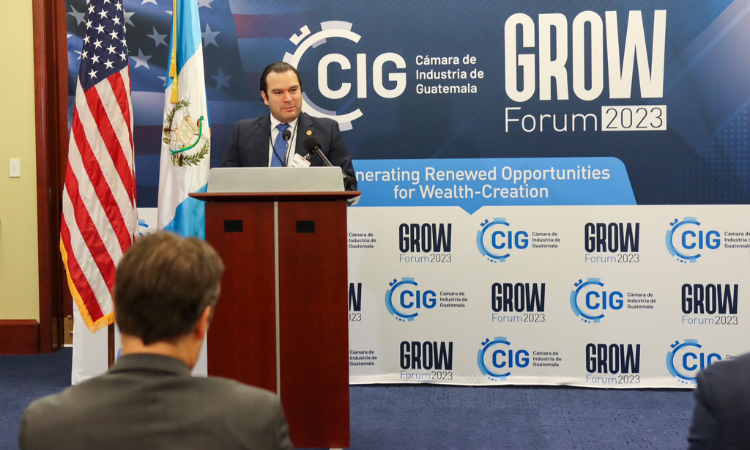On June 6, the Chamber of Industry of Guatemala (CIG) hosted the GROW forum (Generating Renewed Opportunities for Wealth-creation). This event brought together a bicameral, bipartisan group of senators and House representatives to engage with nearshoring and the foreign investment needed in Guatemala to spur industrialization, create prosperity, and reduce illegal immigration.
The event was a spectacular success, on all accounts.
At the GROW Forum, US congressional leaders were provided with a framework by which business allies in Guatemala leverage US nearshoring strategies. These strategies tackle the root causes of economic and political stagnation and illegal immigration, in accordance with the CIG framework known as the “6 I’s for Accelerated Development”:
- Institutions: good governance and strategic public policies;
- Industrialization: quality growth in GDP and employment;
- Investment: domestic and foreign;
- Infrastructure: road, rail, and ports;
- Innovation and R&D: productivity enhancement;
- Integration: regional economic integration of North and Central America.
CIG proposes a renewed focus on institutional-quality and good-government policies and practices. These would best prioritize agroindustrial investment, infrastructure development and innovation/R&D, and economies of scale fueled by greater economic integration of Central and South America.
This multi-pronged effort is designed to jumpstart the industrialization process of the developing economies in the region. This will in turn lead to greater growth in productivity, wealth, income, and job-creation at levels sufficient to mitigate illegal immigration.
Under Guatemalan leadership, CIG’s 6 I’s framework can easily be applied to other countries in Central America and the Caribbean. Guatemalan private-sector leadership will remain fundamental in this strategy. Guatemala is the economic powerhouse of Central America, responsible for almost a third of Central America’s value added in manufacturing, 27 percent of industry and services, and 37 percent of agriculture.
The GROW forum is important because it shows the commitment of a key partner (the private sector) of a key ally (Guatemala) in the effort to combat various common challenges. These include illegal immigration, the increasing power of the drug cartels that control it, and the increasing influence of China in Central America.
@TonyGonzales4TX: “Estados Unidos es un aliado de Guatemala, tenemos que encontrar vías para caminar juntos y crear mejores oportunidades”. pic.twitter.com/2V7AP5789k
— República. (@republicagt) June 7, 2023
Why is Guatemala important?
Democracies in the Americas face challenges on multiple fronts. China’s rising political and economic influence is dominating commerce and foreign investment in the region. Decades of steady but insufficient economic growth and job creation have contributed to the rise in illegal immigration. Hope in the future has declined among the young. Illegal immigration is increasingly tied to human and illegal-narcotics trafficking networks that are creating parallel power structures that undermine state legitimacy and good governance, further contributing to economic and political stagnation in the region.
Make no mistake: China’s rise in the region has been remarkable. The capital stock of Chinese direct investments in Latin America grew from $55.2 billion to $694 billion in the 2011 to 2021 period, an increase of over 1,100 percent in just 11 years. China now represents over 30 percent of exports for important countries such as Chile and Brazil. Likewise, China receives roughly a quarter of imports from countries such as Paraguay, Nicaragua, and even Colombia—a country where the United States invested heavily for reasons of strategic security. For now, Colombia is lost.
The decline of US commercial and economic influence in the region correlates with the displacement of the United States as a positive political influence in the region. One key metric would be the number of countries in the US sphere of influence that recognize Taiwan as an independent country. This is something that the United States promotes worldwide but does not do itself.
Only 13 countries in the world recognize Taiwan as an independent country. Guatemala is the largest of these countries, in terms of population and GDP, due to the fact that the United States itself does not recognize Taiwan. Of these countries, Guatemala is also the closest geographically to the United States.
Were that not sufficient to prove that Guatemala is a loyal US ally, steadfast support for Israel also marks Guatemala as a country deserving of US respect, loyalty, reciprocity and investment. Our foreign policy should recognize Guatemala as a key ally worthy of targeted investment.
Unfortunately, US foreign investment in key allied countries in the most strategic region close to home, Central America, has been falling. Our direct foreign investment flows in Guatemala were half as much in the 2021–2022 time period as they were in 2014–2015. US influence—specifically the ability to shape the political and economic evolution of our closest, nearest allies—is in decline. Guatemala is just one example, but the most important one.
Under the framework of a comprehensive nearshoring industrial strategy, a rational overload of US investment in Guatemala would send a clear message to the world. It would underlie the importance of investing in and rewarding countries that have demonstrated, at great cost, commitment to the principles of political and economic liberalization on the world stage. Guatemala is a world leader in this regard.
CIG, where I work, can take credit for reminding our political leaders of this important fact. Future GROW forums will continue to provide US political leaders with the facts on the ground in Guatemala and Central America in general. It is a positive signal that so many congressional leaders participated in this important event.
 Join us in our mission to foster positive relations between the United States and Latin America through independent journalism.
Join us in our mission to foster positive relations between the United States and Latin America through independent journalism.
As we improve our quality and deepen our coverage, we wish to make the Impunity Observer financially sustainable and reader-oriented. In return, we ask that you show your support in the form of subscriptions.
Non-subscribers can read up to six articles per month. Subscribe here.

